2018中考英语句型高频考点(打印版)
2018中考英语知识点:初中英语常用句型

Everything has two sides. It has both advantages and disadvantages.
4.人类正面临着一个严重的问题,这个问题变得越来越严重。
Manisnowfacingabigproblemwhichisbecomingmoreandmore
serious.
(二)中间段落句
1.但是,我认为这不是解决的好方法,比如。最糟糕的是。
ButIdon'tthinkitisaverygoodwaytosolve.Forexample,Worst
of all,.
2.对我们国家的发展和建设是必不可少的,(也是)非常重要的。首
先,。而且,最重要的是
secondLast but not least,
2.在总体上很难说是好还是坏,因为它在很大程度上取决于的形
势。然而,就我个人而言,我发现。
Itisdifficulttosaywhetherisgoodornotingeneralasitdependsvery
much on the situation of.However, from a personal point of view, I find
4.为什幺?第一个原因是;第二个原因是;第三个原因是。
Why The first reasonis that The second reason is The third is.
5.然而,正如任何事物都有好坏两个方面一样,也有它的不利的一
面,象。
However,justlikeeverythinghasbothitsgoodandbadsides,alsohasits
2018中考初中英语知识点总结(word文档物超所值)
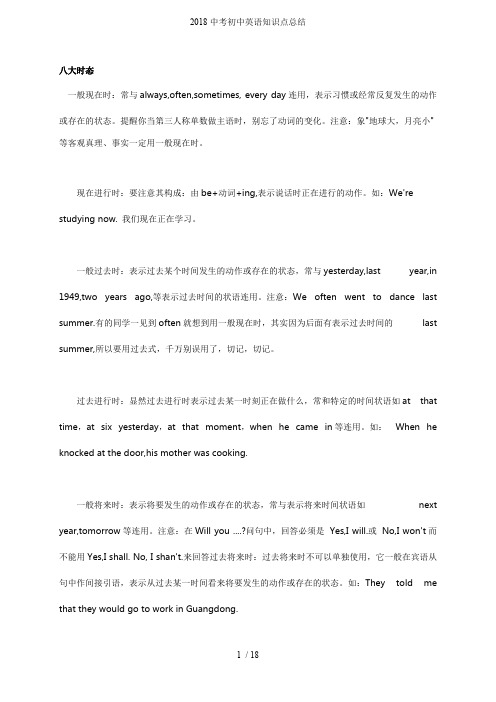
6.先行词里同时含有人或物时,只能使用“that”。例:They talked of things and persons that they remembered in the school.(他们谈论他们记得的有关学校 的事和人。)
一般将来时:表示将要发生的动作或存在的状态,常与表示将来时间状语如
nextΒιβλιοθήκη year,tomorrow 等连用。注意:在 Will you ....?问句中,回答必须是 Yes,I will.或 No,I won't 而
不能用 Yes,I shall. No, I shan't.来回答过去将来时:过去将来时不可以单独使用,它一般在宾语从
一般过去时:表示过去某个时间发生的动作或存在的状态,常与 yesterday,last
year,in
1949,two years ago,等表示过去时间的状语连用。注意:We often went to dance last
summer.有的同学一见到 often 就想到用一般现在时,其实因为后面有表示过去时间的
近几年他去过那里三次了。
d.用包括“现在”在内的时间状语,如:now,today,this morning(month,year,term)等。例如:-Have you met him today?-No,I haven't.
2018中考英语知识点总结:4种常考句型

2018中考英语知识点总结:4种常考句型2018?绉嶅父鑰冨彞鍨?? 鍔ㄨ瘝涓嶅畾寮?( 1)浣滀富璇?To learn a foreign language is not easy.It is not easy to learn a foreign language.( 2)?They began to read.( 3)Jim asked me to help him with his lessons.We often heard her sing.( 4)浣滃畾璇?I have an important meeting to attend.( 5)浣滅姸璇?She went to see her grandma yesterday.( 6)鐢ㄥ湪how, when, where, what, which绛変箣鍚?I don鈥檛know how to use a computer.Do you know when to start?He didn鈥檛know what to do next.鍙ュ瓙绉嶇被(1)闄堣堪鍙?( ?(2)鐤戦棶鍙?()(3)绁堜娇鍙?( 畾寮忓拰鍚﹀畾寮?(4)鎰熷徆鍙?鍙ュ瓙鎴愪唤1)Betty likes her new bike.He gets up early every day.To learn a foreign language is not easy. 2)We work hard.The boy caught a bird.He is my brother.They all look fine.3)Her sister is a nurse.It鈥檚me. I鈥檓ready.He got angry.We were at home last night.His cup is broken.4)Tom bought a story-book.I saw him yesterday.He wanted to have a cup of tea.5)?He gave me some ink.Our teacher told us an interesting story.6)?Call her Xiao Li.You must keep the room clean.John asked me to help him.7)This is a green jeep.This is an apple tree.Are these students your classmates?Winter is the coldest season of the year.I have something to tell you.8)You are quite right.She will arrive in Beijing on Monday.He stopped to have a look.??+杩炵郴鍔ㄨ瘝+( S+V+P)The bike is new.The map is on the wall.?+涓嶅強鐗╁姩璇?( S+V)He swims.?+鍙婄墿鍔ㄨ瘝+( S+V+O)Children often sing this song.?+鍙婄墿鍔ㄨ瘝+闂存帴+( S+V+IO+DO) She showed her friends all her pictures.?+鍙婄墿鍔ㄨ瘝++?( S+V+O+C)We keep our classroom clean and tidy.骞跺垪鍙?He likes maths, but he needs help.I help him and he helps me.1. 澶嶅悎鍙?He said ( that) he felt sick.I don鈥檛know whether ( if) she still works in the factory. I take back what I said.I can鈥檛tell who is there.Can you tell me where the Summer Palace is?The train had left when I got to the station.I鈥檒l go with you to the cinema this afternoon if I鈥檓free.The students went to the farm because the farmers needed some help. The earth is bigger than the moon.He was so tired that he couldn鈥檛walk on.Find the girl who is wearing a red skirt.Show me the picture that you like best.。
2018年中考英语高频句型考点整理(二)

2018年中考英语高频句型考点整理(二)为您整理“2018年中考英语高频句型考点整理(二)”,欢迎阅读参考,更多精彩内容请继续关注本网站相关栏目发布的信息。
2018年中考英语高频句型考点整理(二)11、enough (for sb。
) to do sth。
足够……做……在此结构中,for用来引出不定式的逻辑主语。
例如:The ice isn’t thick enough for you to walk on。
这冰还没有厚到你可以在上面走的程度。
12、feel like doing sth。
想要做……此处like为介词,后面跟动词-ing形式。
此句型与would like to do sth。
同义。
例如:I feel like drinking a cup of milk。
我想喝一杯牛奶。
13、feel/find/think it adj。
/n。
to do sth。
认为某事……在此结构中it为形式宾语,不定式短语作真正的宾语。
例如:I find it very interesting to play football。
我发现踢足球很有趣。
She thinks it her duty to help us。
她认为帮助我们是她的职责。
14、get ready for sth。
/ to do sth。
get ready for sth。
意为“为某事做准备”;get ready to do sth。
意为“准备做某事”例如:We are getting ready for the meeting。
我们正在为会议做准备。
They were getting ready to have a sports meet at that moment。
他们那时正准备开运动会。
15、get/receive/have a letter from 收到……的来信相当于hear from 例如:Did you receive a letter from John?你收到约翰的来信了吗?I got a letter from my brother yesterday。
2018中考英语考点汇总(超详细)

2018中考英语考点汇总(超详细)补全对话部分考点1.打电话用语:一、拨电话方的交际用语:1.Could /May/Can I speak to …,please ? 请找…接电话,好吗?2.Who’s that (speaking) ? 你是哪一位呀?3.This is …(speaking)./This is …here./ …here speaking .我是…….4.Could you ask him / her to call me back ? 你能让他、她给我回电话吗?5.I’m calling to ask / tell you to ….我打电话给你是想告诉你去…….6.That’s very kind of you ( to help me ) . 你能帮助我真是太好了。
二、接电话方的交际用语:1.Hello! 6098724. 你好!这里是6098724.2.This is …..(speaking). 我就是……3.Who’s that (speaking )? 请问你是哪位?4.Yes, it is . 是的,我就是。
No, this is ….. 不,我是……5.Hold on (for a moment ), please . / One moment ,please . 请稍后,别挂机。
6.I’m sorry / afraid he’s /she’s out at the moment / right now . 对不起,他/她现在不在。
7.Can I take a message ( for you ) ? 我能替你稍话吗?8.I’ll leave a message on his / her desk . 我会在他/她的桌上留个便条。
9.What’s your telephone number ? 你的电话是多少?10.I’ll give / take her the message . 我会稍信给她的。
2018中考英语复习(初中句型结构总结)Word版
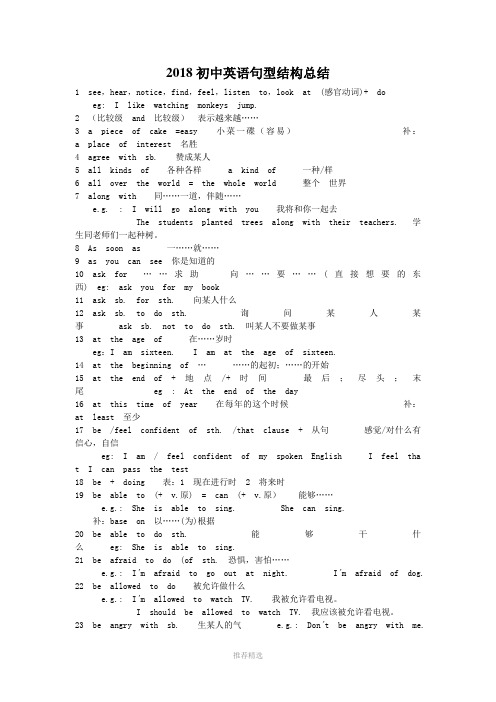
2018初中英语句型结构总结1 see,hear,notice,find,feel,listen to,look at (感官动词)+ doeg: I like watching monkeys jump.2 (比较级and 比较级)表示越来越……3 a piece of cake =easy 小菜一碟(容易)补:a place of interest 名胜4 agree with sb. 赞成某人5 all kinds of 各种各样 a kind of 一种/样6 all over the world = the whole world 整个世界7 along with 同……一道,伴随……e.g. : I will go along with you 我将和你一起去The students planted trees along with their teachers. 学生同老师们一起种树。
8 As soon as 一……就……9 as you can see 你是知道的10 ask for ……求助向……要……(直接想要的东西) eg: ask you for my book11 ask sb. for sth. 向某人什么12 ask sb. to do sth. 询问某人某事ask sb. not to do sth. 叫某人不要做某事13 at the age of 在……岁时eg:I am sixteen. I am at the age of sixteen.14 at the beginning of ………的起初;……的开始15 at the end of +地点/+时间最后;尽头;末尾eg : At the end of the day16 at this time of year 在每年的这个时候补:at least 至少17 be /feel confident of sth. /that clause + 从句感觉/对什么有信心,自信eg: I am / feel confident of my spoken English I feel that I can pass the test18 be + doing 表:1 现在进行时 2 将来时19 be able to (+ v.原) = can (+ v.原)能够……e.g.: She is able to sing. She can sing.补:base on 以……(为)根据20 be able to do sth. 能够干什么eg: She is able to sing.21 be afraid to do (of sth. 恐惧,害怕……e.g.: I'm afraid to go out at night. I'm afraid of dog.22 be allowed to do 被允许做什么e.g.: I'm allowed to watch TV. 我被允许看电视。
2018年中考英语常考句型
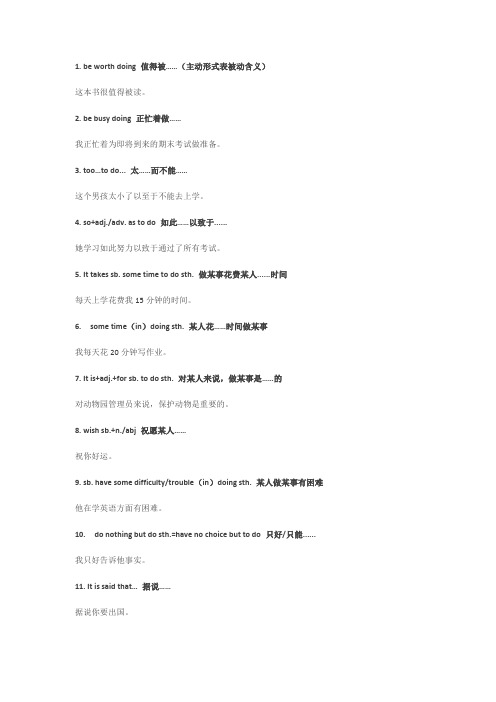
1. be worth doing 值得被……(主动形式表被动含义)这本书很值得被读。
2. be busy doing 正忙着做……我正忙着为即将到来的期末考试做准备。
3. too…to do... 太……而不能……这个男孩太小了以至于不能去上学。
4. so+adj./adv. as to do 如此……以致于......她学习如此努力以致于通过了所有考试。
5. It takes sb. some time to do sth. 做某事花费某人......时间每天上学花费我15分钟的时间。
6. some time(in)doing sth. 某人花……时间做某事我每天花20分钟写作业。
7. It is+adj.+for sb. to do sth. 对某人来说,做某事是……的对动物园管理员来说,保护动物是重要的。
8. wish sb.+n./abj 祝愿某人……祝你好运。
9. sb. have some difficulty/trouble(in)doing sth. 某人做某事有困难他在学英语方面有困难。
10. do nothing but do sth.=have no choice but to do 只好/只能......我只好告诉他事实。
11. It is said that… 据说……据说你要出国。
12. not…until… 直到……才......知道我父母回来我才上床睡觉。
13. 主语+find/consider/think+it+形容词或名词+不定式我发现看这部电影和有趣。
14. so+adj./adv.+that 如此……以致于......su ch+n.+that…如此……以致于......这位女士如此高兴以至于说不出话来。
她是如此善良的女孩以致于班上每个人都喜欢她。
15. why not do sth 为什么不做……呢为什么不复习一下笔记呢16. It's time to do sth. 到做某事的时间了该打扫教室了。
2018中考英语语法必考知识点总结

2018中考英语语法必考知识点总结句子成分:主语、谓语、宾语、表语、定语、宾语补足语和状语1、主语:(1)由名词、代词(人称代词用主格)、动词不定式、动名词等充当,说明动作是“谁”发出的。
如:The painter painted a very nice picture. (画家画了一幅漂亮的画。
) / They fought against SARS bravely. (他们勇敢地与非典搏斗。
) / To see is tobelieve. (耳听为虚眼见为实). / Helping animals is to help people. (帮助动物就是帮助人类。
)(2)动词不定式或动名词做主语时可用it代替,而不定式或动名词移至表语或宾语之后。
如:It is very comfortable to have a Class A seat during the long journey.(在长途旅行中能有个甲等座位简直太舒服了。
) / Eating too much is bad foryour health.(=It is bad for your health eating too much.) (吃得太多对你的身体不利。
)(3)口语中常见主语或“主--系”省略:(It is) nothing. ((那)没有什么。
)/ (It)doesn’t matter. ((那)没有关系。
) / (I) thank you. ((我)谢谢你。
)(4)反意问句的附加问句,主语必须是代词:The man looks worried,doesn’t he? (这个人看上去很着急不是吗?) / Tigers are dangerous animals, aren’t they? (老虎是危险的动物不是吗?)(5)祈使句一般省略主语。
加主语时往往用来指定某个人。
Keep the keyboards clean,children. (孩子们请保持键盘的清洁。
2018年中考英语高频句型考点整理(四)

为您整理“2018年中考英语高频句型考点整理(四)”,欢迎阅读参考,更多精彩内容请继续关注本网站相关栏目发布的信息。
2018年中考英语高频句型考点整理(四)41、There be句型①在此结构中,there是引导词,在句中不能充当任何成分,也不必翻译出来。
句中的主语是某人或某物,谓语动词be要与主语的数保持一致。
例如:There is a man at the door。
门口有一个人。
当主语是由两个或者两者以上的名词充当时,谓语动词be要跟它邻近的那个名词的数一致(就近一致)。
例如:There are two dogs and a cat under the table。
桌下有两只狗和一只猫。
比较:There is a cat and two dogs under the table。
②There be 句型中的be不能用have来代替,但可以用lie(位于,躺),stand(矗立),exist(生存),live(生活)等词来替换。
例如:There stand a lot of tall buildings on both sides of the street。
街道两旁矗立着许多高楼。
There lies lake in front of our school。
我们学校前面有一个湖。
Once there lived a king here。
这儿曾经有一个国王。
There is going to be a sports meeting next week。
下周准备开一个运动会。
there be 的拓展结构: there seem(s)/happen(s) to be…There seems to be one mistake in spelling。
似乎有一处拼写错误。
There happened to be a ruler here。
这儿碰巧有把尺子。
There seemed to be a lot of people there。
2018中考英语作文必备38个句型
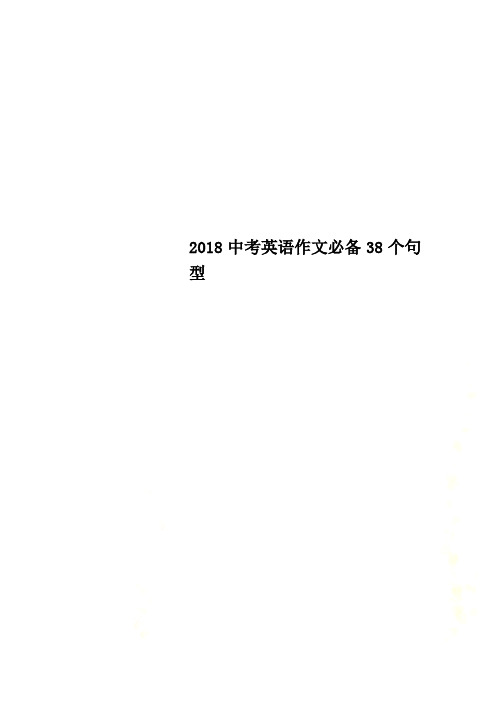
2018中考英语作文必备38个句型2018中考英语作文必备38个句型一、~the + ~ est + 名词+(that)+ 主词+ have ever + seen (known/heard/had/read, etc) ~~~ the most + 形容词+ 名词+(that)+ 主词+ have ever + seen(known/heard/had/read, etc)Helen is the most beautiful girl that I have ever seen。
海伦是我所看过最美丽的女孩。
Mr. Chang is the kindest teacher that I have ever had。
张老师是我曾经遇到最仁慈的教师。
Yao Ming is the tallest basketball player that I have ever seen。
姚明是我所见过的最高的篮球运动员Liu Xiang is the most hardworking sportsman that I have ever seen。
刘翔是我所见过的最勤奋的运动员。
二、Nothing is + ~~~ er than to + VNothing is + more + 形容词 + than to + V例句:Nothing is more important than to receive education。
没有比接受教育更重要的事。
Nothing is more important than to potect our environment。
没有什么比环保更重要的事。
Nothing is more important than to gain knowledge。
没有什么比学习知识更重要的事。
三、~~~ cannot emphasize the importance of ~~~ too much。
2018中考英语必背句型(精品)
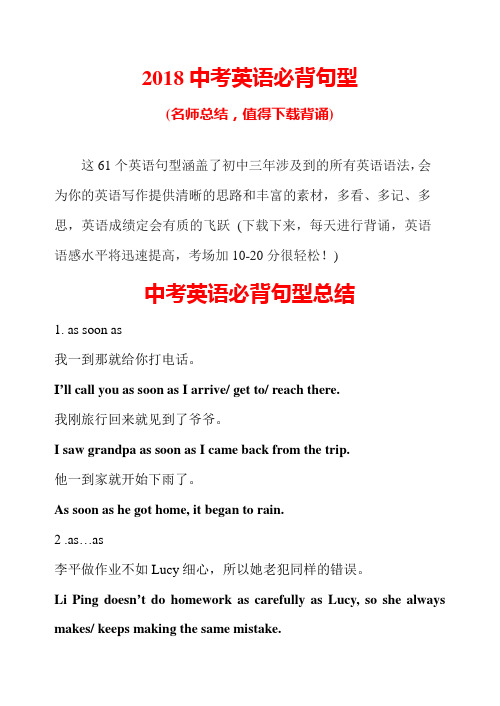
2018中考英语必背句型(名师总结,值得下载背诵)这61个英语句型涵盖了初中三年涉及到的所有英语语法,会为你的英语写作提供清晰的思路和丰富的素材,多看、多记、多思,英语成绩定会有质的飞跃(下载下来,每天进行背诵,英语语感水平将迅速提高,考场加10-20分很轻松!)中考英语必背句型总结1. as soon as我一到那就给你打电话。
I’ll call you as soon as I arrive/ get to/ reach there.我刚旅行回来就见到了爷爷。
I saw grandpa as soon as I came back from the trip.他一到家就开始下雨了。
As soon as he got home, it began to rain.2 .as…as李平做作业不如Lucy细心,所以她老犯同样的错误。
Li Ping doesn’t do homework as carefully as Lucy, so she always makes/ keeps making the same mistake.我和他一样高。
Ii am as tall as him.他跑得不如你快。
He doesn’t run as quickly as you.3 .as…as possible我会尽快给你打电话。
I will call you as soon as possible.请尽早起床。
Please get up as early as possible.学英语的最好方法是尽可能多听,多说。
The best way to learn English well is to listen and speak as much as possible.4 .ask sb. for sth.你可以向那边的警察求助。
You can ask the policeman for help.无论她要什么,父母都会为她找到。
2018中考英语句型高频考点(打印版)

2018中考英语句型高频考点(打印版)D其中的not是对宾语从句进行否定而不是对主句否定(否定前移).that可省略.例如:I don’t think it will rain.我认为天不会下雨.I don’t believe the girl will come.我相信那女孩不会来了.21、It happens that… 碰巧……相当于happen to do.例如:It happened that I heard their secret.可改写为:I happened to hear their secret. 我碰巧听到了他们的秘密. 22、It’s/has been +一段时间+since从句自从某时起做某件事情已经一段时间了该句型中since引导的时间状语从句常用一般过去时.例如:It’s twenty years since he came here.他来这里已经20年了.It has been six years since he married Mary. 他和玛丽结婚已经六年了. 23、It is +adj./n. + for sb. to do sth. 做某事对某人来说……It是形式主语,真正的主语是不定式to do sth.例如:It’s not easy for us to study English well.对我们来说学好英语并不容易.It’s a good idea for us to travel to the south.去南方旅行对我们来说是个好主意.24、It’s + adj. + of sb. to do sth.It是形式主语,to do sth.是真正的主语,当表语(即形容词)能对逻辑主语描述时,常用介词of,而不用for.例如:It’s very polite of you to give your seat to old people.你给老人让座,非常有礼貌.25、It seems/appears (to sb)that… (在某人看来)好像……此句中的it是主语,that引导的是表语从句.例如:It seems that he is lying. 看样子他好像是在撒谎.It appears to me that he never smiles. 在我看来,他从来没有笑过.26、It is +数词+metres/kilometers long/wide… ……是多少米(公里)长(宽)用来表示物体的长(宽,高),如数词大于一,名词要用复数.例如:It is 20 metres long from this end to that end. 从这端到那端有二十米长. 27、It’s time for sb. to do sth. 是某人干某事的时候了it是形式主语,真正的主语是动词不定式to do sth. 例如:It’s time for the child to go to bed.孩子该睡觉了.比较下面两种结构:①It’s time for + n. 例如:It’s time for school.②It’s time to do sth. 例如:It’s time to go to school.28、It takes sb. some time to do sth. 花费某人多少时间做某事it是形式主语,真正的主语是动词不定式to do sth.例如:It takes her fifteen minutes to walk to the bus stop from here.从这儿走着到公交车站将花费她15分钟.It took the old man three days to finish the work.那个老人花了三天时间完成这项工作.29、keep (on)doing sth. 一直坚持做某事keep doing sth.一般用于静态动词.keep on doing sth.意为“继续不停地做某事”,一般用于动态动词,但二者的区别并不是很严格,有时可以互换.例如:Don’t keep on doing such foolish things.不要再做这样的傻事了.He kept sitting there all day. 他整天坐在那里.30、keep…from doing sth. 阻止......做某事相当于stop…from doing sth.,prevent…from doing sth. 在主动句中,stop 和prevent后面的from可以省略,但在被动结构中,from不可以省略.例如:Please keep the children from swimming in the sea. 请别让孩子到海里游泳.The big noise outside my room stopped me from doing my homework.屋外巨大的噪音使我不能做作业.31、keep sb. doing sth. 让某人一直做某事不可和keep sb.from doing sth.结构混淆.例如:Why do you keep me waiting for a long time?你为什么让我等了很长时间?32、make sb. do sth. 使某人干某事make意为“使”时,其后要有不带to的动词不定式.例如:He made me work ten hours a day. 他让我每天工作10小时.注意:上句如改为被动语态,则work 前的to不能省略.例如:I was made to work ten hours a day.33、neither…nor… 既不……也不……当连接两个并列主语时,谓语动词与邻近的主语取得一致(就进一致原则).例如:Neither we nor Jack knows him.我们和杰克都不认识他.He neither knows nor cares what happened.他对发生的事情不闻不问.34、not…until… 直到……才......until后可跟名词或从句,表示时间.例如:He didn’t come until late in the evening.他直到晚上很迟才来.He didn’t ar rive until the game began. 直到比赛开始他才来.35、sb pays money for sth. 某人花钱买某物此句型主语是人.例如:I’ve already paid 2,000 yuan for the motor bike.我已经花了2000元买这辆摩托车.36、spend time/money on sth./(in)doing sth. 花费(时间、钱)在某事上/做某事其中in可以省略,通常主语为“人”.例如:I spent five yuan on this book.我在这本书上花了五元钱.I spent two hours (in)doing my homework yesterday.昨晚我花了两个小时做作业.37、so…that… 太……以至于……用于复合句,that引导的是结果状语从句.so是副词,后面应接形容词或副词,如果接名词,应用such. 例如:The ice is so thin that you can’t walk on it.冰太薄了,你不能在上面走.He is such a kind man that we all like him. 他是一个非常好的人,我们都很喜欢他.38、stop to do sth.,stop doing sth.stop to do sth. 意为“停下来去做另一件事”,stop doing sth.意为“停止正在做的事”例如:You’re too tired. You’d better stop to have a rest.你们太累了,最好停下来休息一会儿.The teacher is coming. Let’s stop talking.老师来了,咱们别说话了.39、Thank you for doing sth. 感激你做了某事.for之后除了加动名词doing外,还可以加名词.例如:Thank you for giving me the present.谢谢你给我的礼物.Thank you for your help. =Thank you for helping me.谢谢你的帮助.40、thanks to 多亏……,由于……thanks后的s不能省略,to是介词.例如:Thanks to my friend Jim,I’ve worked out this problem.多亏了我朋友吉姆的帮助,我已经解决了这个问题.41、There be句型①在此结构中,there是引导词,在句中不能充当任何成分,也不必翻译出来.句中的主语是某人或某物,谓语动词be要与主语的数保持一致.例如:There is a man at the door. 门口有一个人.当主语是由两个或者两者以上的名词充当时,谓语动词be要跟它邻近的那个名词的数一致(就近一致).例如:There are two dogs and a cat under the table. 桌下有两只狗和一只猫.比较:There is a cat and two dogs under the table.②There be 句型中的be不能用have来代替,但可以用lie(位于,躺),stand (矗立),exist(生存),live(生活)等词来替换.例如:There stand a lot of tall buildings on both sides of the street.街道两旁矗立着许多高楼.There lies lake in front of our school. 我们学校前面有一个湖.Once there lived a king here. 这儿曾经有一个国王.There is going to be a sports meeting next week.下周准备开一个运动会.there be 的拓展结构:there seem(s)/happen(s)to be…There seems to be one mistake in spelling. 似乎有一处拼写错误.There happened to be a ruler here. 这儿碰巧有把尺子.There seemed to be a lot of people there.那儿似乎有很多人.42、The + adj.比较级,the + adj.比较级越……,越……此句型表示一方随另一方的变化而变化.例如:The harder he works,the happier he feels. 他工作越努力,就感到越幸福.The more,the better. 多多益善.43、too+adj./adv. + to do sth. 太……以至于不能…….此句型为简单句,后面的to表示否定含义.例如:The ice is too thin for you to walk on. 这冰太薄,你不能在上面走.The bag is too heavy to carry. 这个袋子太重搬不动.44.used to do sth. 过去常常做某事used to是情态动词,表示过去的习惯动作或状态,现在已不存在,因此只用于过去时态.例如:He used to get up early.他过去总早起.When I was yong,I used to play tennis very often.我年轻时经常打网球.否定形式有两种:didn’t use to;used not to,例如:He didn’t use to come. = He usedn’t to come.他过去不常来.45、what about…?……怎么样?后面可接名词、代词、动名词等.与“how about…?”同义.例如:We have been to Hainan. What about you?我们去过海南,你呢?What about going to the park on Sunday?星期天去公园怎么样?46、What day/date is it today?今天星期几(几月几日)?—What day is it today?—Sunday.—What date is it today?—June 24th.47、What’s wrong (the matter)with…?……怎么了?What’s wrong with you,Madam?夫人,您怎么了?You look worried. What’s wrong with you?你看上去很焦急,出什么事了?48、Why not do…?为什么不做……?谓语动词用原形.与Why don’t you do…?同义.例如:Why not go to see the film with us?= Why don’t you go to see the film with us?为什么不和我们一起去看电影呢?49、would like to do sth. 想做……后用动词不定式作宾语.例如:I would like to drink a cup of tea. 我想喝一杯茶.疑问句式:Would you like (to drink) a cup of tea?你想喝杯茶吗?50、adj./adv.比较级+ and adj./adv.比较级越来越......若形容词/副词为双音节词及多音节词,则这一结构变为“more and more +形容词/副词”.例如:It’s getting warmer and warmer. 天气变得越来越暖和了.The little girl becomes more and more beautiful. 小女孩变得越来越漂亮了.51、adj.比较级+thanthan引导的是典型的比较级句型,表示“一者比另一者……”,其前用形容词或副词的比较级,than从句可以用省略形式.例如:I know you better than she does. 我比她更了解你.This house is bigger than that one. 这所房子比那所房子大.52、though-从句though引导的是让步状语从句,意思是“虽然……但是……”.但不能和but连用,英语中表达“虽然……,但是……”时,though和but只能用一个.例如:Though it was snowing,it was not very cold. 虽然下着雪,可并不太冷.I was late for the last bus though I hurried. 虽然我拼命赶路,还是没搭上最后一班公交车.We didn’t feel tired though we walked a long way. 虽然我们走了很长的路程,但是并没有感到累.53、if-从句If 引导的是条件状语从句,“如果;假如“.如主句用一般将来时,if从句要用一般现在时(主将从现).例如:If I go to the Great Wall tomorrow,would you like to come along?如果明天我去长城,你会和我一起去吗?If it rains tomorrow,I won’t go. 如果明天下雨,我就不去了.54、because-从句引导原因状语从句,“因为”. 例如:He didn’t hear the knocking at the door because he was listening to the radio. 他没有听见敲门声,因为他正在听收音机.55、so + do/be + 主语“So + be/助动词/情态动词+ 主语” 表示前面所述内容也适用于另一人或物.be、助动词或情态动词的选择视前面陈述句中谓语动词的时态形式而定.例:He likes football and so do I. 他喜欢足球,我也如此.Jim was playing football just now and so was Tom. 刚才吉姆在踢足球,汤姆也在踢足球.比较:“So +主语+be/助动词/情态动词.”结构,是用来证实前一句所表达的内容(起强调作用).be、助动词或情态动词的选择视前面陈述句中谓语动词的时态形式而定.A:It is very hot today. 今天天气很热.B:So it is. 确实如此.56、not only…but also… 不但……而且……常用来连接语法作用相同的词、短语或句子.连接两个主语时,谓语动词要和紧靠它的主语在人称和数上保持一致.例如:She likes not only singing but also dancing. 她不但喜欢唱歌,而且喜欢跳舞.He is not only a good doctor but also a good father. 他不但是个好医生而且是个好爸爸.Not only I but also he is hoping to go there. 不但我而且他也想去那儿.57、prefer…to… 喜欢……胜过…...prefer (doing)sth. to (doing)sth. 意为“两者相比更喜欢(做)其中之一”.在此结构中,to是介词,接名词或动名词,结构中前后所跟成分一样.例如:He prefers tea to coffee. 茶与咖啡相比,他更喜欢茶.He prefers doing shopping to going fishing.购物与钓鱼相比,他更喜欢购物.58、感叹句型What (a/an)+ adj. + n. +主语+谓语!How + adj./adv.+ +主语+谓语!例如:What a clever boy (he is)!=How clever the boy is!这个男孩儿多聪明啊!What a wonderful film we saw last night!昨天晚上我们看的电影多精彩啊!How lovely the weather is!天气多好啊!How hard he works!他工作多么努力啊!59、祈使句型祈使句型表示命令、请求、劝告等含义.说话的对象通常为第二人称,习惯上常省略.句末用句号或感叹号.肯定祈使句是:谓语动词用动词原形表示.否定祈使句是:在谓语动词前加do not(don’t).例如:Be here on time tomorrow. 明天准时到这儿来.Say it in English!用英语说!Don’t be afraid!别怕!Don’t look out of the window!不要朝窗外看!60、并列句型用并列连词连接起来的两个或两个以上的简单句叫并列句.连接并列句常用的连接词有:and,but,or,so,however,not only…but also...,neither…nor...,either…or…等.例如:I help her and she helps me. 我帮助她,她帮助我.He is very old but he is in good health. 他年纪很大了,但他身体很好.We must hurry,or we’ll be late. 我们得赶快走,不然就晚了.Kate does her work carefully,so she never makes any mistakes. 凯特工作很认真,从不出错.。
2018中考英语语法必考知识点归纳.
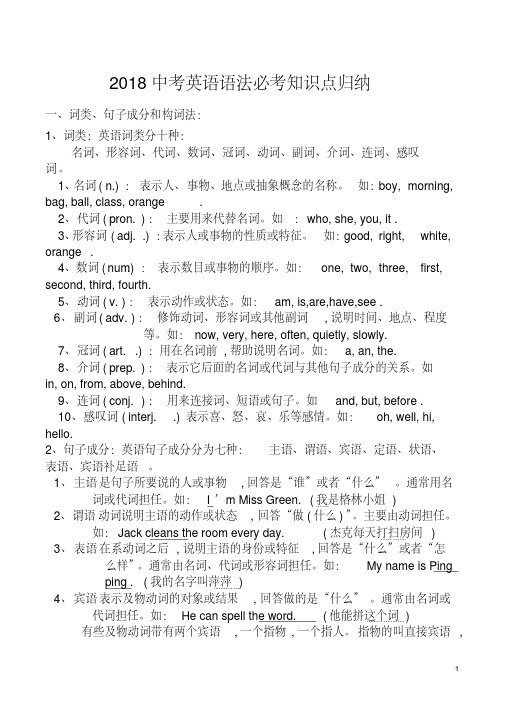
clean ( 打扫 , 弄干净 ), 等等。
(2) 动词→名词 , 如:look, walk, rest, work, study, swim, go, talk
等等。
(3) 名词→动词 , 如: hand( 手 ) →( 传递 ), face ( 脸 ) →( 面对 ) 等等。
(4) 形容词→副词 , 如: early →early, fast →fast 等等。
the doctor ’s( 诊所 )
② 两人共有某物时 , 可以采用 A and B’s 的形式 , 如:Lucy and Lily ’s
bedroom( 露西和丽丽合住的卧室 )
③ “ of+ 名词所有格 / 名词性物主代词” , 称为双重所有格 , 如: a friend
of my father ’s( 我父亲的一位朋友 ) , a friend of mine ( 我的一
3、形容词 ( adj. .) :表示人或事物的性质或特征。 如:good, right, white,
orange .
4、数词 ( num.) : 表示数目或事物的顺序。如: one, two, three, first,
second, third, fourth.
5、动词 ( v. ) : 表示动作或状态。如: am, is,are,have,see .
in, on, from, above, behind.
9、连词 ( conj. ) : 用来连接词、短语或句子。如 and, but, before .
10、感叹词 ( interj. .) 表示喜、怒、哀、乐等感情。如: oh, well, hi,
hello.
2、句子成分:英语句子成分分为七种: 主语、谓语、宾语、定语、状语、
2018中考英语知识点:重点句型、词组

2018中考英语知识点:重点句型、词组2018中考英语知识点:重点句型、词组重点句型、词组1. She used to be aacher. 她过去是一位汉语老师。
[用法] used to + 动词原形,表示过去经常性的动作或存在的状态,含有现在不再如此之意。
[搭配] used to do的否定式可以是usedn’t to do 或didn’t use to do.[比较] used to do sth. 过去常做某事;be/ get used to doing sth. 习惯于做某事;be used to do sth. 被用来做某事。
2.…retulater.……迟早要将它归还。
[用法] l)later意为“迟早”、“早晚”。
2)return此处用作及物动词,意为“归还”,相当于give back.[拓展]return还可用作不及物动词,意为“返回”,相当于go back或come back。
3.No matter what the wealike…无论天气……[用法]no matter what 相当于whatever,其意为“无论什么”,引导状语从句。
[拓展]类似no matter what的表达方式还有:no matter when无论什么时候nbsp; nbsp;nbsp;no matter where无论什么地方no matter who无论谁no matter how 无论怎么样4. A young man practised speaking English wGreen.一位年经人与格林先生练习讲英语。
[用法]practise doing sth. 表示“实践、练习(做)某事”。
[拓展]practice名词,“实践”、“实施”、“练习”;put a plaactice实行某计划。
5. He encouraged evake pag our lakes, rivers, seas and oceans.他鼓励大家参加保护我们的湖泊、河流和海洋的活动。
- 1、下载文档前请自行甄别文档内容的完整性,平台不提供额外的编辑、内容补充、找答案等附加服务。
- 2、"仅部分预览"的文档,不可在线预览部分如存在完整性等问题,可反馈申请退款(可完整预览的文档不适用该条件!)。
- 3、如文档侵犯您的权益,请联系客服反馈,我们会尽快为您处理(人工客服工作时间:9:00-18:30)。
2018中考英语句型高频考点1、as…as 和……一样中间必须用形容词或副词原级. 例如:This classroom is as big as that one. 这间教室和那间一样大.He runs as fast as Tom. 他和汤姆跑的一样快.否定结构:not as/so…as,“不如……”.上面的两个句子可分别改为:This classroom is not as/so large as that one. 这间教室不如那间大.He doesn’t run as/so fast as Tom. 他跑得不如汤姆快.2、as soon as 一……就……用来引导时间状语从句.若主句是一般将来时,从句要用一般现在时.例如:I’ll tell him the plan as soon as I see him. 我一看到他就告诉他这个计划.He’ll go home as soon as he finishes his work. 他一完成工作就回家.3、be busy/enjoy/hate/go on/finish doing sth. 忙于/喜欢/讨厌/继续/完成做某事在enjoy,finish,hate,go on,be busy等词语后,一般用动词-ing形式作宾语.例如:Lin Tao is busy making a model plane.林涛正忙着做飞机模型.My mother enjoys taking a walk after supper.我妈妈喜欢晚饭后散步.I hate watching Channel Five. 我讨厌看五频道.When someone asked him to have a rest,he just went on working.当有人让他休息一会儿时,他仍继续工作.I have finished writing the story. 我已经写完了故事.4、fill…with 用……装满……;be filled with 充满了……;be full of 充满了……①be filled with 说明由外界事物造成的此种状态,表示被动.例如:The box is filled with food. 盒子里装满了食物.②be full of说明主语处于的状态.此外,还可表示程度,意为“非常”.例如:The patient’s room is full of flowers. 那个病人的房间摆满了花.The young man is full of pride. 那个年轻人非常骄傲.③这两种结构还可以相互改写.例如:I fill the box with food. The box is full of food.5、be good/bad for 有利于/有害于……此句型是:be+adj.+for+n.结构.例如:Doing morning exercises is good for your health. 做早操对你的健康有益.Always playing computer games is bad for your study.总玩电脑游戏对你的学习不利.6、be used to(doing)sth. 习惯于……后必须接名词或动名词,可用于现在、过去、将来的多种时态.be 可用get,become来代替. 例如:He is used to life in the country.(He is used to living in the country.)他习惯于乡村生活.He will get used to getting up early. 他将会习惯于早起.注意:be used to do 的意思是“被用来做……”.例如:Wood is used to make paper. 木材被用来造纸.7、both…and…两者都……用来连接两个并列成分;当连接两个并列主语时,其后谓语动词用复数.例如:Both the students and the teachers will go to the History Museum tomorrow.不论老师还是学生明天都会去历史博物馆.8、can’t help doing sth. 禁不住做某事help在此的意思是“抑制,忍住”,其后接动词-ing形式.例如:His joke is too funny. We can’t help laughing.他的笑话太有趣了,我们禁不止笑了起来.9、sth. costs sb. some money 某物花费某人多少钱此句型的主语是物.cost一词带的是双宾语,它的过去式、过去分词和原型一样.This book cost me five yuan. 这本书花了我五元钱.10、either…or… 不是……就是……,或者……或者……用来连接两个并列成分,当连接并列主语时,谓语动词与邻近的主语保持一致.You may either stay here or go home. 你可以呆在这儿,也可以回家.Either she or I am right. = Either I or she is right. 不是她对就是我对.11、enough (for sb.)to do sth. 足够……做……在此结构中,for用来引出不定式的逻辑主语.例如:The ice isn’t thick enough for you to walk on.这冰还没有厚到你可以在上面走的程度.12、feel like doing sth. 想要做某事此处like为介词,后面跟动词-ing形式.此句型与would like to do sth.同义.例如:I feel like drinking a cup of milk. 我想喝一杯牛奶.13、feel/find/think it adj./n. to do sth. 认为某事……在此结构中it为形式宾语,不定式短语作真正的宾语.例如:I find it very interesting to play football. 我发现踢足球很有趣.She thinks it her duty to help us. 她认为帮助我们是她的职责.14、get ready for sth./to do sth.get ready for sth.意为“为某事做准备”;get ready to do sth.意为“准备做某事”例如:We are getting ready for the meeting. 我们正在为会议做准备.They were getting ready to have a sports meet at that moment.他们那时正准备开运动会.15、get/receive/ a letter from 收到……的来信相当于hear from 例如:Did you receive a letter from John?你收到约翰的来信了吗?I got a letter from my brother yesterday. 我昨天收到了我弟弟的一封来信.16、had better (not)do sth. 最好(别)做某事had better为情态动词,其后需用动词原形.had better常用缩写,变成’d better,其否定形式是在其后直接加not.例如:We had better go now. = We’d better go now. 我们最好现在走吧.You’d better not go out because it is windy. 今天刮风,你最好别出去了.17、have sth. done 使(某事)完成(动作由别人完成)sth.为宾语,done为过去分词作补语.例如:We had the machine repaired. 我们请人把机器修好了.注意区分:We have repaired the machine. 我们(自己)已经修好了机器. 18、help sb. (to)do sth./with sth. 帮助某人(做)某事其中的to可以省略.例如:I often help my mother with housework. 我常常帮助妈妈做家务.Would you please help me (to)look up these words?请你帮助我查查这些词好吗?19、How do you like…?你认为……怎么样?与what do you think of …?同义. 例如:How do you like the weather in Beijing?你认为北京的天气怎么样?你觉得这部新电影如何?20、I don’t think/believe that… 我认我/相信……不……其中的not是对宾语从句进行否定而不是对主句否定(否定前移).that可省略.例如:I don’t think it will rain. 我认为天不会下雨.I don’t believe the girl will come. 我相信那女孩不会来了.21、I t happens that… 碰巧……相当于happen to do.例如:It happened that I heard their secret.可改写为:I happened to hear their secret. 我碰巧听到了他们的秘密.22、It’s/has been +一段时间+since从句自从某时起做某件事情已经一段时间了该句型中since引导的时间状语从句常用一般过去时.例如:It’s twenty years since he came he re. 他来这里已经20年了.It has been six years since he married Mary. 他和玛丽结婚已经六年了.23、It is +adj./n. + for sb. to do sth. 做某事对某人来说……It是形式主语,真正的主语是不定式to do sth.例如:It’s not easy for us to study English well. 对我们来说学好英语并不容易.It’s a good idea for us to travel to the south. 去南方旅行对我们来说是个好主意.24、It’s + adj. + of sb. to do sth.It是形式主语,to do sth.是真正的主语,当表语(即形容词)能对逻辑主语描述时,常用介词of,而不用for.例如:It’s very polite of you to give your seat to old people.你给老人让座,非常有礼貌.25、It seems/appears (to sb)that… (在某人看来)好像……此句中的it是主语,that引导的是表语从句.例如:It seems that he is lying. 看样子他好像是在撒谎.It appears to me that he never smiles. 在我看来,他从来没有笑过.26、It is +数词+metres/kilometers long/wide… ……是多少米(公里)长(宽)用来表示物体的长(宽,高),如数词大于一,名词要用复数.例如:It is 20 metres long from this end to that end. 从这端到那端有二十米长.27、It’s time for sb. to do sth. 是某人干某事的时候了it是形式主语,真正的主语是动词不定式to do sth. 例如:It’s time for the child to go to bed.孩子该睡觉了.比较下面两种结构:①It’s time for + n. 例如:It’s time for school.②It’s time to do sth. 例如:It’s time to go t o school.28、It takes sb. some time to do sth. 花费某人多少时间做某事it是形式主语,真正的主语是动词不定式to do sth.例如:It takes her fifteen minutes to walk to the bus stop from here.从这儿走着到公交车站将花费她15分钟.It took the old man three days to finish the work.那个老人花了三天时间完成这项工作.29、keep (on)doing sth. 一直坚持做某事keep doing sth.一般用于静态动词.keep on doing sth.意为“继续不停地做某事”,一般用于动态动词,但二者的区别并不是很严格,有时可以互换.例如:Don’t keep on doing such foolish things. 不要再做这样的傻事了.He kept sitting there all day. 他整天坐在那里.30、keep…from doing sth. 阻止......做某事相当于stop…from doing sth.,prevent…from doing sth. 在主动句中,stop和prevent后面的from可以省略,但在被动结构中,from不可以省略.例如:Please keep the children from swimming in the sea. 请别让孩子到海里游泳.The big noise outside my room stopped me from doing my homework.屋外巨大的噪音使我不能做作业.31、keep sb. doing sth. 让某人一直做某事不可和keep sb.from doing sth.结构混淆.例如:Why do you keep me waiting for a long time?你为什么让我等了很长时间?32、make sb. do sth. 使某人干某事make意为“使”时,其后要有不带to的动词不定式.例如:He made me work ten hours a day. 他让我每天工作10小时.注意:上句如改为被动语态,则work 前的to不能省略.例如:I was made to work ten hours a day.33、neither…nor… 既不……也不……当连接两个并列主语时,谓语动词与邻近的主语取得一致(就进一致原则).例如:Neither we nor Jack knows him.我们和杰克都不认识他.He neither knows nor cares what happened.他对发生的事情不闻不问.34、not…until… 直到……才......until后可跟名词或从句,表示时间.例如:He didn’t come until late in the evening. 他直到晚上很迟才来.He didn’t arrive until the game began. 直到比赛开始他才来.35、sb pays money for sth. 某人花钱买某物此句型主语是人.例如:I’ve already paid 2,000 yuan for the motor bike.我已经花了2000元买这辆摩托车.36、spend time/money on sth./(in)doing sth. 花费(时间、钱)在某事上/做某事其中in可以省略,通常主语为“人”.例如:I spent five yuan on this book.我在这本书上花了五元钱.I spent two hours (in)doing my homework yesterday.昨晚我花了两个小时做作业.37、so…that… 太……以至于……用于复合句,that引导的是结果状语从句.so是副词,后面应接形容词或副词,如果接名词,应用such. 例如:The ice is so thin that you can’t walk on it. 冰太薄了,你不能在上面走.He is such a kind man that we all like him. 他是一个非常好的人,我们都很喜欢他.38、stop to do sth.,stop doing sth.stop to do sth. 意为“停下来去做另一件事”,stop doing sth.意为“停止正在做的事”例如:You’re too tir ed. You’d better stop to have a rest. 你们太累了,最好停下来休息一会儿.The teacher is coming. Let’s stop talking. 老师来了,咱们别说话了.39、Thank you for doing sth. 感激你做了某事.for之后除了加动名词doing外,还可以加名词.例如:Thank you for giving me the present.谢谢你给我的礼物.Thank you for your help. =Thank you for helping me.谢谢你的帮助.40、thanks to 多亏……,由于……thanks后的s不能省略,to是介词.例如:Thanks to my friend Jim,I’ve worked out this problem.多亏了我朋友吉姆的帮助,我已经解决了这个问题.41、There be句型①在此结构中,there是引导词,在句中不能充当任何成分,也不必翻译出来.句中的主语是某人或某物,谓语动词be要与主语的数保持一致.例如:There is a man at the door. 门口有一个人.当主语是由两个或者两者以上的名词充当时,谓语动词be要跟它邻近的那个名词的数一致(就近一致).例如:There are two dogs and a cat under the table. 桌下有两只狗和一只猫.比较:There is a cat and two dogs under the table.②There be 句型中的be不能用have来代替,但可以用lie(位于,躺),stand (矗立),exist(生存),live(生活)等词来替换.例如:There stand a lot of tall buildings on both sides of the street.街道两旁矗立着许多高楼.There lies lake in front of our school. 我们学校前面有一个湖.Once there lived a king here. 这儿曾经有一个国王.There is going to be a sports meeting next week.下周准备开一个运动会.there be 的拓展结构:there seem(s)/happen(s)to be…There seems to be one mistake in spelling. 似乎有一处拼写错误.There happened to be a ruler here. 这儿碰巧有把尺子.There seemed to be a lot of people there.那儿似乎有很多人.42、The + adj.比较级,the + adj.比较级越……,越……此句型表示一方随另一方的变化而变化.例如:The harder he works,the happier he feels. 他工作越努力,就感到越幸福.The more,the better. 多多益善.43、too+adj./adv. + to do sth. 太……以至于不能…….此句型为简单句,后面的to表示否定含义.例如:The ice is too thin for you to walk on. 这冰太薄,你不能在上面走.The bag is too heavy to carry. 这个袋子太重搬不动.44.used to do sth. 过去常常做某事used to是情态动词,表示过去的习惯动作或状态,现在已不存在,因此只用于过去时态.例如:He used to get up early.他过去总早起.When I was yong,I used to play tennis very often.我年轻时经常打网球.否定形式有两种:didn’t use to;used not to,例如:He didn’t use to c ome. = He usedn’t to come.他过去不常来.45、what about…?……怎么样?后面可接名词、代词、动名词等.与“how about…?”同义.例如:We have been to Hainan. What about you?我们去过海南,你呢?What about going to the park on Sunday?星期天去公园怎么样?46、What day/date is it today?今天星期几(几月几日)?—What day is it today?—Sunday.—What date is it today?—June 24th.47、What’s wrong (the matter)with…?……怎么了?What’s wrong with you,Madam?夫人,您怎么了?You look worried. What’s wrong with you?你看上去很焦急,出什么事了?48、Why not do…?为什么不做……?谓语动词用原形.与Why don’t you do…?同义.例如:Why not go to see the film with us?= Why don’t you go to see the film with us?为什么不和我们一起去看电影呢?49、would like to do sth. 想做……后用动词不定式作宾语.例如:I would like to drink a cup of tea. 我想喝一杯茶.疑问句式:Would you like (to drink) a cup of tea?你想喝杯茶吗?50、adj./adv.比较级+ and adj./adv.比较级越来越......若形容词/副词为双音节词及多音节词,则这一结构变为“more and more +形容词/副词”.例如:It’s getting warmer and warmer. 天气变得越来越暖和了.The little girl becomes more and more beautiful. 小女孩变得越来越漂亮了. 51、adj.比较级+thanthan引导的是典型的比较级句型,表示“一者比另一者……”,其前用形容词或副词的比较级,than从句可以用省略形式.例如:I know you better than she does. 我比她更了解你.This house is bigger than that one. 这所房子比那所房子大.52、though-从句though引导的是让步状语从句,意思是“虽然……但是……”.但不能和but连用,英语中表达“虽然……,但是……”时,though和but只能用一个.例如:Though it was snowing,it was not very cold. 虽然下着雪,可并不太冷.I was late for the last bus though I hurried. 虽然我拼命赶路,还是没搭上最后一班公交车.We didn’t feel tired though we walked a long way. 虽然我们走了很长的路程,但是并没有感到累.53、if-从句If 引导的是条件状语从句,“如果;假如“.如主句用一般将来时,if从句要用一般现在时(主将从现).例如:If I go to the Great Wall tomorrow,would you like to come along?如果明天我去长城,你会和我一起去吗?If it rains tomorrow,I won’t go. 如果明天下雨,我就不去了.54、because-从句引导原因状语从句,“因为”. 例如:He didn’t hear the knocking at the door because he was listening to the radio. 他没有听见敲门声,因为他正在听收音机.55、so + do/be + 主语“So + be/助动词/情态动词+ 主语” 表示前面所述内容也适用于另一人或物.be、助动词或情态动词的选择视前面陈述句中谓语动词的时态形式而定.例:He likes football and so do I. 他喜欢足球,我也如此.Jim was playing football just now and so was Tom. 刚才吉姆在踢足球,汤姆也在踢足球.比较:“So +主语+be/助动词/情态动词.”结构,是用来证实前一句所表达的内容(起强调作用).be、助动词或情态动词的选择视前面陈述句中谓语动词的时态形式而定.A:It is very hot today. 今天天气很热.B:So it is. 确实如此.56、not only…but also… 不但……而且……常用来连接语法作用相同的词、短语或句子.连接两个主语时,谓语动词要和紧靠它的主语在人称和数上保持一致.例如:She likes not only singing but also dancing. 她不但喜欢唱歌,而且喜欢跳舞.He is not only a good doctor but also a good father. 他不但是个好医生而且是个好爸爸.Not only I but also he is hoping to go there. 不但我而且他也想去那儿.57、prefer…to… 喜欢……胜过…...prefer (doing)sth. to (doing)sth. 意为“两者相比更喜欢(做)其中之一”.在此结构中,to是介词,接名词或动名词,结构中前后所跟成分一样.例如:He prefers tea to coffee. 茶与咖啡相比,他更喜欢茶.He prefers doing shopping to going fishing.购物与钓鱼相比,他更喜欢购物. 58、感叹句型What (a/an)+ adj. + n. +主语+谓语!How + adj./adv.+ +主语+谓语!例如:What a clever boy (he is)!=How clever the boy is!这个男孩儿多聪明啊!What a wonderful film we saw last night!昨天晚上我们看的电影多精彩啊!How lovely the weather is!天气多好啊!How hard he works!他工作多么努力啊!59、祈使句型祈使句型表示命令、请求、劝告等含义.说话的对象通常为第二人称,习惯上常省略.句末用句号或感叹号.肯定祈使句是:谓语动词用动词原形表示.否定祈使句是:在谓语动词前加do not(don’t).例如:Be here on time tomorrow. 明天准时到这儿来.Say it in English!用英语说!Don’t be afraid!别怕!Don’t look out of the window!不要朝窗外看!60、并列句型用并列连词连接起来的两个或两个以上的简单句叫并列句.连接并列句常用的连接词有:and,but,or,so,however,not only…but also...,neither…nor...,either…or…等.例如:I help her and she helps me. 我帮助她,她帮助我.He is very old but he is in good health. 他年纪很大了,但他身体很好.We must hurry,or we’ll be late. 我们得赶快走,不然就晚了.Kate does her work carefully,so she never makes any mistakes. 凯特工作很认真,从不出错.。
